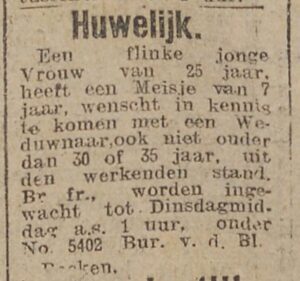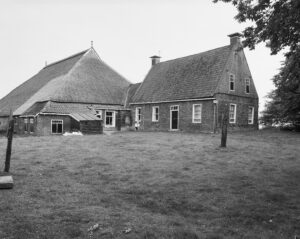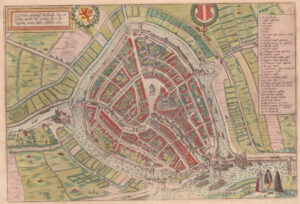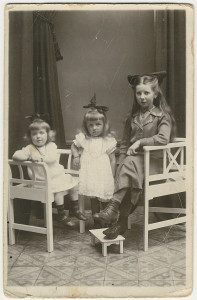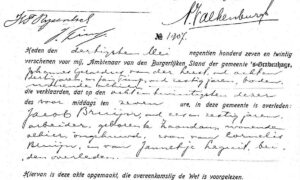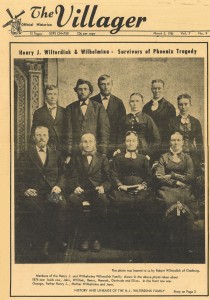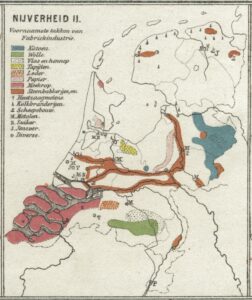The leeftijd is the age. You may find a person's age mentioned in birth records (father, informant, witnesses), marriage records (bride and groom, witnesses), death records (deceased, informant, witnesses), census records, and also in some court or notarial records, especially when people testify about something. As you go back further in time, there will be fewer records that give a person's age. Keep in mind that illiterate people are less likely to know their own age. An age that ends in 0 … [Read more...]
Quick tip – Did they know the witness?
You may encounter witnesses in several types of records: Baptismal records Church marriage records Aldermen's court marriage records Civil registration records of births, marriages, and deaths Notarial records. When you come across witnesses, ask yourself: would this be the type of event a random person would witness? Or is the person likely to have been a close connection to the person of interest? For example, a notary may have asked a neighbor to witness a will, but the … [Read more...]
Dutch term – Contactadvertentie
A contactadvertentie is a contact ad, an advertisement by a person looking for a spouse. The ads are almost always anonymous, but give you some idea what people found important in a spouse. Example This ad from the Rotterdamsch Nieuwsblad [Rotterdam Newspaper] of 14 January 1913 shows one woman using an ad to find a spouse. Marriage A capable young woman age 25, with a girl age 7, wishes to make her acquaintance with a widower, no older than 30 or 35, from the working class. Letters … [Read more...]
Postgraduate Certificate in Family and Local History
I have exciting news: I have received a Postgraduate Certificate in Family and Local History from the University of Dundee in Scotland. I started in September 2020. I actually met the requirements for the certificate a few months ago but thought I could not claim it yet because I did not receive any paperwork. The university just confirmed that I do indeed meet all the requirements. They don't send you a certificate if you continue on to the diploma, like I did, but that does not make it any … [Read more...]
Dutch term – Kop-hals-rompboerderij
A kop-hals-rompboerderij (literally: head-neck-torso farm) is a type of farm. The living area formed the head of the farm, where the farmer's family would have lived. A narrow corridor (the neck), sometimes with bedsteads for staff, connected the living area to the stables where the animals were housed (the torso). It is a type of farm mainly found in the northern provinces of Friesland and Groningen. … [Read more...]
Dutch Genealogy News for April 2022
This is an overview of the new sources, websites, and projects that were announced last month. Sources The website Brabant in Beelden has added several videos of villages in Noord-Brabant to their website. Indexes of notarial records from the late 1800s have been added to the Westfries Archief website. Scans of index cards of The Hague church records have been added to the Haags Gemeentearchief website. The Indies Genealogical Society published an index of people who died in … [Read more...]
Quick tip – Research living people first
When you are just starting researching your family history, focus on the living people first. They have the stories that you won't find in records. The dead will keep! And if you're lucky, they may even be willing to take a DNA test. Start with the oldest generations, but do not forget to capture the stories of the younger generations too. I had been doing genealogy for over ten years when my grandmother asked me if I had ever found out when her aunt died. She had last heard from her more … [Read more...]
Ask Yvette – How to find a Dutch will
One of our Twitter followers, Karen de Bruyne, asked on Twitter how to find the will of her great-grandfather-in-law Jacob Bruijn, who died in The Hague on 28 May 1927. Since there are several ways to go about it, I thought I would write a blog post about it. Most people in the Netherlands did not have wills, either because there was not much to inherit, or because they were happy with the default way their estate would be inherited. Since 1811, wills were recorded by notaries. Before … [Read more...]
Dutch term – Broer, broeder
A broer or broeder (old spelling) is a brother. A half-brother is a halfbroer or broeder van halven bedde (brother of half a bed; old term). See the chart for other Dutch terms for relationships. … [Read more...]
Factory industries in the Netherlands in 1875
I came across this lovely map in the collection of the National Archives of the Netherlands, which shows the main types of factories in 1875. Translation of the legend: Katoen - Cotton Wolle - Wool Vlas en hennep - Flax and hemp Tapijten - Carpets Leder - Leather Papier - Paper Meekrap - Madder Steenbakkerijen - Brick factories Houtzaagmolens - Wood saw mills Kalkbranderijen - Lime kilns Scheepsbouw - Ship building Metalen - Metalworking Suiker - Sugar Jenever - Gin Diverse … [Read more...]


